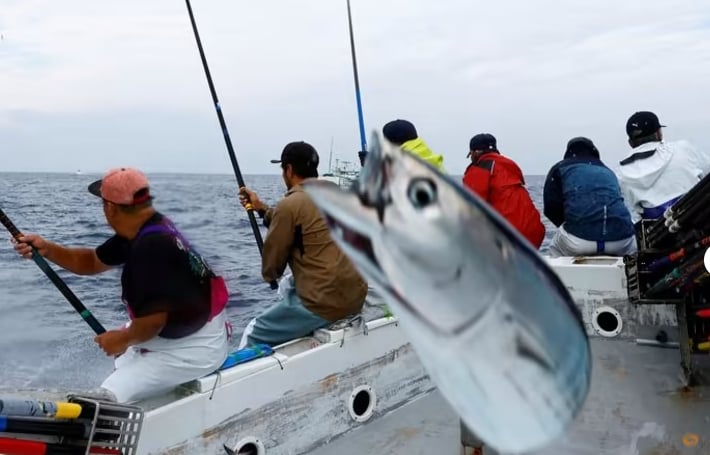November 28, 2025 | 02:26 GMT +7
November 28, 2025 | 02:26 GMT +7
Hotline: 0913.378.918
November 28, 2025 | 02:26 GMT +7
Hotline: 0913.378.918

Crew members on the Nakajomaru katsuo (skipjack tuna) fishing boat catch katsuo using traditional ipponzuri (single pole fishing method) in Tosa Bay, Koichi Prefecture, Japan, May, 15, 2022. Photo: RT
The Nature Sustainability journal study, which centred on three species of tuna, found climate change would likely change their migration patterns. That raised the potential for conflict between some of the world’s most valuable fisheries and the prospective mining in the Clarion-Clipperton Zone southeast of Hawaii.
Mining companies say the ocean floor is potentially rich in metals including nickel and cobalt used in batteries for electric vehicles, so their extraction will support the global energy transition.
The U.N. body that regulates the sector is expected to press pause on plans to extract minerals from the ocean floor when it meets this month due to environmental and economic risks.
“The high seas harbor a trove of biodiversity, and there are critical sectors of our economy that depend on this biodiversity,” said study co-author Dr. Juliano Palacios Abrantes from the University of British Columbia.
“There is already uncertainty about the impact of climate change on the health and geographic range of tuna. Deep-sea mining will only add to this uncertainty, further threatening tuna species and associated fisheries.”
Potentially impacting the fish would be plumes of sediment stirred up by mining of sea nodules and any associated noise or light pollution that could impact reproduction rates, among other issues, the study found.
The research was released alongside a letter from seafood industry groups advocating for a pause in deep-sea mining development until the socioeconomic and environmental impacts could be more thoroughly analysed.
"In the vast expanse of the high seas, critical for tuna species, we find ourselves sailing into uncharted territory with the unknown risks posed by deep-sea mining,” said Daniel Suddaby, executive director at Global Tuna Alliance whose 48 industry partners account for 32 per cent of the global tuna trade.
(Reuters)

(VAN) A new study reveals how the simultaneous effects of ocean acidification, salinity and loss of oxygen are making the world more fragile.

(VAN) Hopes are growing that the creation of the first 3D turkey gut model could be a turning point in the battle against the virulent blackhead disease.

(VAN) Tyson, America’s biggest meat supplier, plans to shutter one of its largest beef processing plants as the industry continues to struggle with low cattle supplies and political pressure from Washington.

(VAN) New FAO study shows how digital solutions are empowering farmers and fishers to prevent losses and build resilient agrifood systems.

(VAN) Brazil's COP30 presidency pushed through a compromise climate deal on Saturday that would boost finance for poor nations coping with global warming but that omitted any mention of the fossil fuels driving it.

(VAN) Poultry farmers in the UK have been warned that they could face one of the worst winters yet for bird flu.

(VAN) Prices of main-crop paddy have risen sharply, with jasmine rice hitting 16,100 baht per tonne — the highest level in years.